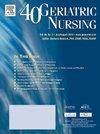Predicting intentions to receive a COVID-19 booster vaccination among older adults using the Theory of Planned Behavior
IF 2.5
3区 医学
Q3 GERIATRICS & GERONTOLOGY
引用次数: 0
Abstract
The purpose of this study was to use the Theory of Planned Behavior to predict older adults' intentions and related factors of getting COVID-19 booster vaccinations and compare gender differences. A cross-sectional study was conducted, and 147 adults aged 65 years or older were recruited by convenience sampling in Taiwan. Results revealed that 57.1 % of participants had positive intentions of getting a COVID-19 booster vaccination. Attitudes, subjective norms, and perceived behavioral control explained 86.0 % of the behavioral intentions of getting a COVID-19 booster vaccination. Perceived behavioral control was the most important factor, followed by attitudes. Differences in intentions of getting the COVID-19 booster vaccination between males and females were not significant. The Theory of Planned Behavior and its main constructs can be appropriately applied to predict intentions to receive COVID-19 booster vaccinations among older adults.
利用计划行为理论预测老年人接种 COVID-19 加强型疫苗的意愿。
本研究旨在运用计划行为理论预测老年人接种 COVID-19 加强型疫苗的意向和相关因素,并比较性别差异。本研究采用横断面研究方法,通过便利抽样在台湾招募了 147 名 65 岁或以上的成年人。结果显示,57.1% 的参与者对接种 COVID-19 加强型疫苗持积极态度。态度、主观规范和感知行为控制解释了86.0%的接种COVID-19加强型疫苗的行为意向。认知行为控制是最重要的因素,其次是态度。男性和女性接种 COVID-19 加强型疫苗的意向差异并不显著。计划行为理论及其主要结构可适当用于预测老年人接种 COVID-19 加强型疫苗的意向。
本文章由计算机程序翻译,如有差异,请以英文原文为准。
求助全文
约1分钟内获得全文
求助全文
来源期刊

Geriatric Nursing
医学-护理
CiteScore
3.80
自引率
7.40%
发文量
257
审稿时长
>12 weeks
期刊介绍:
Geriatric Nursing is a comprehensive source for clinical information and management advice relating to the care of older adults. The journal''s peer-reviewed articles report the latest developments in the management of acute and chronic disorders and provide practical advice on care of older adults across the long term continuum. Geriatric Nursing addresses current issues related to drugs, advance directives, staff development and management, legal issues, client and caregiver education, infection control, and other topics. The journal is written specifically for nurses and nurse practitioners who work with older adults in any care setting.
 求助内容:
求助内容: 应助结果提醒方式:
应助结果提醒方式:


